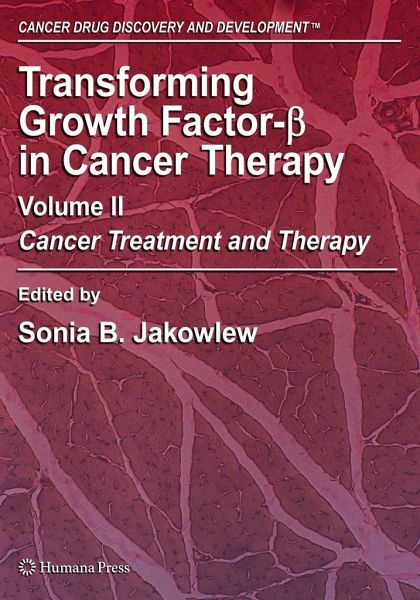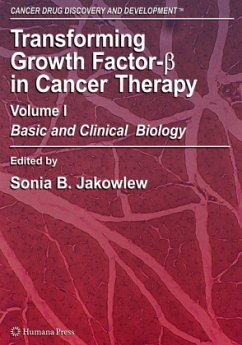
Transforming Growth Factor-Beta in Cancer Therapy, Volume II
Cancer Treatment and Therapy
Herausgegeben: Jakowlew, Sonia B.;Mitarbeit: Heldin, C.-H.
Versandkostenfrei!
Versandfertig in 6-10 Tagen
190,99 €
inkl. MwSt.

PAYBACK Punkte
95 °P sammeln!
Transforming Growth Factor-B in Cancer Therapy, Volume II: Cancer Treatment and Therapy The chapters in this volume confer an abundance of knowledge about the current state ofour understanding oftransforming growth factor-B (TGF-B) in cancer treatment and therapy. Unlike several more traditional positive polypeptide growth factors that stim ulate cellular proliferation, the prototypical TGF-B is now known to inhibit the growth of most normal cell types, including those of epithelial and mesenchymal origin. However, there are examplesofcell types that can be stimulated by TGF-B under certain co...
Transforming Growth Factor-B in Cancer Therapy, Volume II: Cancer Treatment and Therapy The chapters in this volume confer an abundance of knowledge about the current state ofour understanding oftransforming growth factor-B (TGF-B) in cancer treatment and therapy. Unlike several more traditional positive polypeptide growth factors that stim ulate cellular proliferation, the prototypical TGF-B is now known to inhibit the growth of most normal cell types, including those of epithelial and mesenchymal origin. However, there are examplesofcell types that can be stimulated by TGF-B under certain conditions. TGF-B also induces the accumulation of matrix molecules by stimulating their synthesis as well as inhibiting their degradation. Moreover, TGF-B induces apoptosis of certain cell types, thereby restricting their proliferation. OveractivityofTGF-~ has been linked to several diseases. For instance, the effect ofTGF-~ on matrix accumulation contributes to fibrotic conditions, like glomerulonephritis, lung fibrosis and liver cirrhosis (1). TGF-~ has a very complicated role in cancer that is only beginning to be understood.












